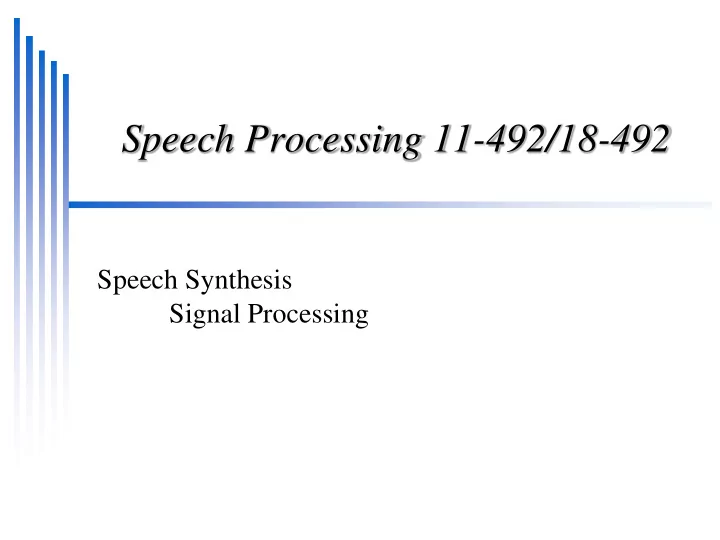

Speech Processing 11-492/18-492 Speech Synthesis Signal Processing
Signal Manipulation Signal Parameterization Joining LPC PSOLA: pitch and duration modification Statistical Parameterization MELCEP/MLSA LSF, STRAIGHT, HNM, HSM
TTS Signal Processing Join together pieces of speech Prosodic modification Pitch (F0) Duration Power Change spectral properties Stress/unstress Spectral tilt Speaking style
Joining Just put them together Gets clicks at join points Join them at zero crossings Window them and overlap them WSOLA Join them at pitch periods
Prosodic Modification Modify pitch and duration independently Changing sample rate changes both “chipmunk” style speech Duration Duplicate/delete parts of the signal Pitch “resample” to change pitch
Speech and Short Term Signals
Duration Modification
Pitch Modification
Modify pitch and duration Find ideal pitch periods and duration Find closest actual periods from units End with Pitch period (short term signals) Distances between them
Signal Reconstruction TD- PSOLA™ Time domain pitch synchronous overlap and add Patented by France Telecom Expired 2004 Very efficient: No FFT (or inverse FFT) Can modify Hz * 2.0 (or 0.5) The reason no one publishes algorithms The (partial) reason unit selection typically doesn’t do pitch/duration modification
LPC: Linear predictive coding • Linear predictive coding – Predict next sample point from previous – Weighted sum of previous points – Filter of order p. – Residual excited LPC
LPC Works well but can be buzzy Can be very compact Can be pitch synchronous Excited Pulse Triangular pulse Multi-pulse Full residual Used in standard speech coding LPC10: 2.4kps CELP: codebook excited LPC
Other Parametric Representations Typically split spectral and residual MBROLA: Multi-band overlap and add HNM/HSM: Harmonic plus (noise/stochastic) modeling STRAIGHT MELCEP/MLSA Often used in HMM synthesis Sinusoidal (HARMONIC) Wavelet LSF/LPC
We don’t need no Parameterization Predict the time domain signal directly Deepmind’s Wavenet (van den Oord et al 2016) Cf of PixelRNN and PixelCNN models Predict sequences of quantized PCM 16,000 times a second Sort of unit selection at the very very local signal level Has a strong “Language Model” (it can “babble”) Similar quality to unit selection Some properties of SPSS though Very very expensive to train Expensive to run (or maybe not any more)
Choosing the right unit type Diphones Phone-phone Joins at stable portions, not transitions Half phone (AT&T Natural Voices) Hybrid systems (Hadifix – Bonn systems) Other selection systems: Syllable, phone, HMM state Even frame level
Acoustically Derived Units E.g Bacchiani 99 or Rita Singh CMU From some waveforms Find N most diverse unit types Varied in length Still need to map letters to units
Acoustic Phonetic Clustering Parameterize database Melcep plus power K-means Euclidean distance measure 100 clusters Label DB with best cluster Build clunits synthesizer Can’t predict APC cluster directly Use held out data for testing
Acoustic Phonetic Clustering
Grapheme Based Synthesis Synthesis without a phoneme set “End -to- End” synthesis Use the letters as phonemes (“ alan ” nil (a l a n)) (“black” nil ( b l a c k )) Spanish (easier ?) 419 utterances HMM training to label databases Simple pronunciation rules Polici’a -> p o l i c i ’ a Cuatro -> c u a t r o
Spanish Grapheme Synthesis
English Grapheme Synthesis Use Letters are phones - 26 “phonemes” - ( “alan” n (a l a n)) - ( “black” n (b l a c k)) - Build HMM acoustic models for labeling - For English - “This is a pen” - “We went to the church at Christmas” - Festival intro - “do eight meat” - Requires method to fix errors - Letter to letter mapping -
Signal Processing for TTS Pitch and duration modification LPC Finding the right unit type Grapheme-based Synthesis
HW2: TTS Due 3:30pm Mon October 16 th and 23rd Like the website says Install Festival and Festvox Find 10 errors in each of two different synthesizers Build a voice A Talking Clock A general voice (or both)
Recommend
More recommend